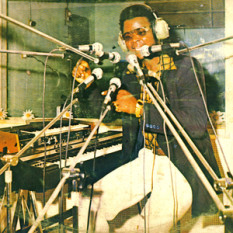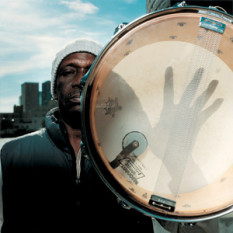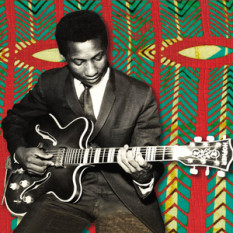Orlando Julius (born Orlando Julius Aremu Olusanya Ekemode, 1943) is a Nigerian musician, singer-songwriter and multi-instrumentalist. He is credited as one of the first musicians to fuse US R&B into traditional highlife music, creating his own influential Afrobeat sound during the mid-‘60s. From his time playing in the USA during the 1970s onwards, he is credited with bringing African music to a broader audience and famously co-composed the song ‘Going Back To My Roots’ with Lamont Dozier. He still plays and records regularly today.
An indigene of Ilesha in Osun State, Orlando Julius Ekemode was born in Ikole-Ekiti to a trading family. His father first traded in Abeokuta before moving to Ikole-Ekiti where he was given a piece of land by the traditional ruler of the town and encouraged to settle there. Orlando was the fourth son in the family and the younger brother of Professor Gabriel Ekemode of the University of Ife, Ile-Ife (now Obafemi Awolowo University).
His journey into music began at an early age when he was a pupil of St. Peter’s Anglican School, Ikole-Ekiti, learning drums, flute, bugle and other instruments. He played drums and flute for the school band, as well as for a local group known as Mambo Dance Band. After finishing school in 1957 and, following the death of his father in the same year, he left Ikole-Ekiti for Ibadan (then capital of the Western region) in search of a job. Whilst in the city, he worked as a bakery assistant and at the same time, tried to keep alive his dream of pursing a career in music, playing with various musicians as a drummer and flautist:
“My father died when I was still young so I wasn’t able to continue education after High School,“ remembers OJ. “I told my Mum that I wanted to go to Ibadan, the capital at the time. I reached there in 1957 and went to different clubs at night where bands were playing highlife and juju. I would sit by the stage, watch them and ask if I could feature with them. I was a small boy. One musician said, ’give him a chance!’ and they let me play drums. The crowds loved it and began spraying my forehead with money.”
He played for a time under J. Oyeshiku and Cotey Necoy of Ghana and Julius Araba. His real wish was to become a saxophonist and, in keeping with the tradition of the time, he started an apprenticeship with Ademola Haastrup (aka. Jazz Romero), one of the brightest horn players in Nigeria at the time. Orlando first landed a job with Romero’s band, Action Group, playing trap drums. He was not only impressed with the band’s organisation but also judged it to be the one of the best equipped in the country for musical instruments. Around this time, the Western region Premier, Obafemi Awolowo, raised money to buy instruments for schools in Nigeria and created a central base for this in Ibadan. This provided a great opportunity for up-and-coming musicians to practice their skills and become professionals. Julius was taught there on various instruments and attributes his success as a musician to the persisting influence of his experience in Ibadan.
In Early 1958, Orlando Julius went to Ondo State with Haastrup to start the Modupe Dance Band. He played drums with the band whilst continuing to learn saxophone and, in June 1958, he played the alto saxophone for the first time on stage. Towards the end of 1958 the band moved on to Akure-Ekiti, to the Flamingo Hotel and were renamed as the Flamingo Dandies Band. Jazz Romero left the group after a misunderstanding with the owner of the hotel and Orlando became the new bandleader. Although the band members felt that Orlando had what it took to lead, he personally felt too inexperienced to handle such responsibility, despite his modern approach to arranging highlife music. After a short time, Orlando decided to move back to Ibadan to gain more experience.
Re-locating back to Ibadan, Orlando returned to the Action Group band and began to travel frequently between Lagos and Ibadan. In Lagos, Orlando played in Nyingifa‘s band while, in Ibadan, he played with Rex Williams at the Mayflower Club. In 1959, Orlando landed a job with Eddie Okonta and his Top Aces band at the Central Hotel and Paradise Club, a major step for Orlando in his career (he had always admired Okonta’s music and used to stand on a pile of blocks to watch the band play at the Paradise Club in 1957).
While playing with Eddie Okonta, Orlando had the opportunity to welcome Louis Armstrong to Ibadan. Armstrong performed and presented Eddie Okonta with a special trumpet which had a golden mouthpiece and his white handkerchief. Within Eddie Okonta’s band, Orlando was appointed the horn arranger and parts scorer and enjoyed a fruitful period, playing on WNTV, Ibadan’s ‘First In Africa’ and touring extensively across Nigeria.
In 1960, after the Nigerian Independence celebrations, Orlando traveled to Ljebu-Ode to work with Y.S. Akinibosun’s Right Time Dance Band and worked with them for over six months. After meeting his brother I.K. Dairo and his band at a gig in Ijebu-Ode, I.K. convinced Orlando to come back home to Ijesha to lead I.K.’s Dance Band. During this time, he formed his own band and recorded his first single under his own name, ’Igbehin Adara’ b/w ‘Jola Ade’ in the NBC Radio Station in Ibadan, released on Alowonle Records. Orlando also co-wrote and arranged some of I.K.Dairo’s hits such as ‘Solome’, ‘Bola Ti To’ and more.
By 1963, Orlando had started forming his Modern Aces band in Ibadan. The name Modern Aces was chosen because of Orlando’s unique style and modernisation of highlife music. The new band played parties, universities, clubs and weddings and began to build a significant following nationally; in 1963, Orlando recorded for the first time with Phillips Records. The debut Phillips single, ‘Jagua Nana’, backed with ‘Ishe Logun’ became a major hit, both within and outside of Nigeria.
In mid-1964, following the success of ‘Jagua Nana’, Orlando was signed to play a weekly weekend show on WNTV in Nigeria, produced by Segun Shofowote. During this time he met and worked with Ambassador Segun Olusola and many other TV producers including Orlando Martins. Orlando was then contracted to play on the Bar Beach Show on Channel 10 in Lagos, where he worked with producer Art Alade and others for two quarters. Between 1963-64 Orlando and His Modern Aces continued to play many high profile engagements including Havana Festival at the University of Ibadan and all Universities in Nigeria, Chief Obafemi Awolowo’s birthday celebrations and Chief Rotimi Willams' 25th Anniversary.
O.J. and the Modern Aces continued their series of landmark 45s for Phillips / Polydor as further hits followed ‘Jagua Nana’ – ‘Topless’ (which briefly earned Orlando the nickname ‘The Topless Man’), ‘Ololufe’ and ‘E Se Rere’. Compiling the singles together and adding further tracks, Phillips released ‘Super Afro Soul’ in 1966 as a 10“ album, a confident and effortless union of highlife, jazz and R&B, the music of Nigerian independence fused with the soundtrack to Afro-America’s struggle for civil rights.
“I decided to add sounds and make my own soul music. I was listening to John Coltrane, Otis Redding, Smokey Robinson, Sam & Dave. I brought in a bit of that here and there. The African rhythms, Kokoma rhythms are the backbone and soul, jazz, even calypso, came together with it to make ‘Super Afro Soul’.“
Orlando honed his writing and arranging of this new highlife sound at his Ibadan residency at the Independent Hotel. Fela Ransome Kuti And Orlando first met there and Orlando would feature Fela playing trumpet. Many major Nigerian artists at the time played at Independence Hotel on Orlando’s invitation such as I.K. Dairo, Rex Lawson, Paramount 8 from Ghana, Eric Akaeze, Bola Johnson, Biodun Bakare, Tunji Oyelana and others. Jimi Solanke was Orlando’s first vocalist from I.K.’s band, Eddie Fayehun played trumpet and Moses Akanbi played trap drum. Among Orlando’s fans during this period was James Brown, who came to Lagos and Ibadan in 1969 and performed at the Liberty Stadium. Brown and his band came to watch Orlando play in Ibadan and Orlando visited the Premier Hotel to talk to him in person the following day.
In 1967, Orlando changed his band’s’ name to Afro-Sounders, essentially an expanded version of the Modern Aces featuring new members including trombonist Raheemi Brown. The new big band played many shows across Nigeria, Benin and Ghana and recorded two further albums for Phillips in Lagos: ‘Orlando’s Idea’ and ‘Ishe’, each evolving its own sound as changes and new sounds propelled forward the Lagos music scene. These albums featured a heavier, funkier highlife fusion, responding to rock, psychedelia and the raw funk sounds coming in from the USA and the band scored further hits between 1968 and 1970 with ‘Alo Mi Alo’, ‘Home Sweet Home’, ‘Psychedelic Afro Shop’ and ‘James Brown Ride On’ among others.
In 1972, at the invitation of his label, Polydor, Orlando travelled to Germany, Switzerland and the USA. Orlando’s band continued to play at home in between tour dates with regular gigs at Club Chicago in Surulere, Gondola night club, Bata Koto and many others in Lagos.
Orlando finally left for the USA in 1974 after recording the ‘Disco Hi-Life’ album for Jofabro,[4] featuring Dora Ifodu. Orlando lived in Manhattan, New York, but soon moved over to Washington D.C. Whilst there, he worked with Melvin Deal during his time as Artist In Residence at the city’s colleges and universities and soon formed his own new band, Umoja. With members including Gboyega Adelaja, Stanley Todd, Frankie Todd, Asante, Harry Opoku and Glenn Warren (son of legendary Ghanaian drummer Guy Warren), Umoja supported for Isaac Hayes, Rufus & Chaka Khan, Gil Scott Heron, The O’Jays, Gladys Knight & The Pips, Harold Melvin and The Blue Notes, Staple Singers and Curtis Mayfield[5] courtesy of promoter and manager, Ron Hood.
In 1974, Hugh Masekela stopped in D.C. on the way back from the ‘Rumble In The Jungle’ concert in Zaire and came by a Umoja rehearsal. As he walked in, the band was playing Orlando’s composition, ‘Ashiko’, and Masekela began to join in on fluegelhorn.
Hugh subsequently worked with Umoja as his backing band and Orlando played a major role in the writing and production for Masekela’s albums ‘The Boys Doin’ It’ (1975) and ‘Colonial Man’ (1976), including the tracks ‘Ashiko’, ‘Excuse Me Please’ and ‘A Person Is A Sometime Thing’. The band toured for two years with Masekela during 1975-6 across the U.S, Canada, Hawaii, Ghana, and Liberia and played with Grover Washington, Sara Vaughn, Isley Brothers, Miles Davis, Nina Simone and Herbie Hancock (at Carnegie Hall).
Basing himself in Pasadena, California following the Hugh Masekela tour, Orlando began working further with Masekela’s producer, Stewart Levine, writing and arranging for the Crusaders and teaching Stix Hooper Afrobeat drumming styles. Levine then asked Orlando to work on Lamont Dozier’s ‘Peddlin’ Music On The Side’ album. From a demo cassette of the song ‘Going Back To My Roots’ which included the bass and guitar riffs from ‘Ashiko’, Julius echoed the theme of the song by adding a Yoruba chorus, translated as “let us remember where we came from”. Adding in chants from the Afro Sounders hit ‘Home Sweet Home’, Julius’ elements would eventually comprise most of the second half of the song. Sadly, Julius was only credited with “arrangements” on the final LP credits.
The song was a landmark, the first time that a Nigerian artist had recorded in his own language with a leading American artist. The song became a hit on on U.S. commercial radio and a subsequent cover by London-based group Odyssey took the song to number 5 in the US charts (Julius only heard the Odyssey version for the first time in 2001). Around this time, Orlando appeared in the film ‘Roots: The Next Generation’ courtesy of footballer O.J. Simpson, the famous footballer. He also met his future wife, Latoya Eduke, through the Nigerian highlife musician Ambrose Campbell.
In 1978, Orlando moved back to the Bay Area near San Francisco. To further his knowledge in the recording field, he studied audio engineering and production in Bear West Studios and also studied film production at the Berkeley Film Institute. Orlando also attended Laney College in Oakland for photography, television production and further music courses. While studying he was still performing, teaching American musicians about world beat rhythms and Afro Beat music and, under his tutelage, many world beat bands formed in the Bay Area and San Francisco including Big City, Freaky Executives, Zulu Spear and more.
Between 1980 and 1983 at the Scarab Club in Berkeley, California, Orlando and his Ashiko band would feature musicians from different popular groups including Sheila E, Coke and Pete Escovedo. He continued to play live on the same bill as John Lee Hooker, B.B. King and Art Blakey at the Keystone Corner in San Francisco. He also played colleges, clubs and festivals with his friend Prof. C.K. Ladzekpo from Ghana, a professor of music at U.C. Berkeley.
In 1984, Orlando returned home to Nigeria to begin recording his album ‘Dance Afro Beat’ at EMI Studios in Lagos, eventually releasing it through Shanachie in the US. Following successful sales, Orlando returned to Nigeria to release the album in his homeland and create some accompanying videos. With the videos for the tracks ‘Adara’ and ‘Dance Afro Beat’ (recorded in the Osun Shrine and at Badagry beach respectively), Orlando set the pace for music videos in Nigeria, setting a new, high professional production standard.
Despite working with many musicians in the USA, Orlando embarked on a project to bring 21 Nigerian musicians, the Nigerian All-Stars, to the U.S. for a tour in 1985. Dates included the New Orleans Jazz Festival (Orlando would return there to play in 1989 and 1992). He continued to record during the 1980s, producing the album ‘Sisi Sade’ in 1989 and ‘We Pray For Peace’ in 1991, both released on his own Ashiko Records imprint.
During 1992, Orlando and his Nigerian All-Stars toured heavily in the US, playing venues and festivals alongside stars such as Ray Charles, B.B. King, The Temptations, Smokey Robinson, Ohio Players and Sun Ra. Carlos Santana personally selected Orlando and his Nigerian All-Stars to accompany him to Hawaii to play his annual festival.
In 1994 Orlando and Latoya moved to Nashville, Tennessee to work with Ambrose Campbell. Whilst based in Nashville, Orlando produced the television programme ‘Afrobeat Videos’, presenting African music videos on a local Nashville channel. Orlando and Latoya constructed their own warehouse recording studio, Afro Beat Studios, and recorded the album ‘The Legend Continues’. Disney released the movie The Lion King later that year and Orlando and His Nigerian All-Stars were invited to play for the launch event in Florida.
Yearning to return home, Orlando and Latoya moved back to Nigeria in December 1998. By 1999, Orlando had set up a new recording and rehearsal studio in Surulere, Lagos, and recruited musicians to form a new incarnation of his Nigerian All-Stars.
By 2001, Western audiences had begun to wake up to Orlando’s illustrious career. UK label Strut reissued the 1966 album ’Super Afro Soul’ before other labels including Soundway and Vampi Soul began releasing his Afro Sounders recordings, all spreading the word on OJ’s pioneering influence.
Back home, Orlando spearheaded The Nigerian Musicians Forum with the help of Eko FM and LTV8 to tackle the problems of the nation’s ailing music industry. The forum openly discussed the issues of piracy, mechanical fees, professionalism, past problems and solutions. He also recorded movie soundtracks for Wale Fanu’s ‘Owo Blow’, Tunde Kelani’s ‘Saworoide’ and Tunji Bamishigbin’s ‘Eku Ida’ among many others. Passionate about reviving highlife music, he also recorded albums for Nigerian legends including Fatai Rolling Dollar and Alaba Pedro, guitarist from Roy Chicago’s band.
Orlando moved to Ghana in 2003 after playing a concert at Panafest (the long-running Pan-African Historical Theatre Project). He set up a studio in Accra and recorded his most recent album there, ’Longevity & Reclamation’. He moved back to Nigeria in 2008.
Other recent projects have included recordings with Hot Casa signing Setanta including a cover of his classic ’Ijo Soul’ and sessions with young musicians in Nigeria for a British Council project in association with Soundthread.
Currently, he is preparing to release an all-new studio album, ‘Jaiyede Afro’ in collaboration with UK super-group The Heliocentrics on Strut in September 2014. He also performed his first ever gig in the UK in September 2013 with The Heliocentrics for Afri-Kokoa at London’s Rich Mix venue.
Orlando Julius lives on the outskirts of Lagos with his wife Latoya Aduke Ekemode. .
You can find information through the best music search engine - Muzlan.top 😊All materials on request "Orlando Julius" are available on page Orlando Julius
Yes of course. You can listen tracks on the page Orlando Julius
Yes of course. You can download tracks on the page Orlando Julius
This page is found by queries: Orlando Julius free download, Orlando Julius track minus, Orlando Julius all mp3, Orlando Julius flac, Orlando Julius song listen



